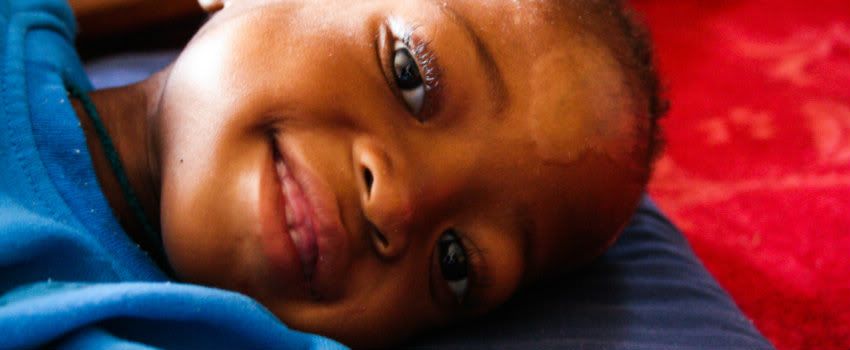...It's been a tough few weeks. I'm tired and feel a bit run down. The past couple days I've been avoiding the babies because I have a cold that won't shake. Still, there's so much to do. Life doesn't pause and I feel like the world is swirling around me at an ever-quickening pace.
As a group, I think the babies are turning a corner. It no longer seems like a giant amalgam of illnesses is barreling through the safe-home at breakneck speed. Karabo is her happy self again, Nthati is smiling far more and Nteboheng is almost at the point of being healthy enough to go home.
But some of the babies still aren't faring well.
Selloane is still feverish. Lipuo is in the hospital with the same respiratory symptoms that Ntseliseng had last week. Ntseliseng is sitting up and eating much more and breathing calmly, but she was so sick last week -- and so weak when we first got her -- that she's in constant threat. I worry about her the most.
With all that's been going on, it's been easy to forget the world outside of Mokhotlong. Sometimes the sense of isolation in this place is stark and in your face, but when things get truly hectic, you forget it. It becomes an emotional relic, tied to reality only by the slowly fleeting novelty of being here.
In a way, forgetting the isolation alleviates it. But in another, more insidious way, forgetting the isolation gives it a secret power, a tethered control over your subconscious mind. You begin to suffer from it unknowingly, simply by failing to acknowledge it outright.
Living here, there are moments when I suddenly pause, sit back and reconsider where I am and what I am doing, and marvel at the world and its vastness. It was in one of those moments last night when I thought about the forgotten isolation, and yearned for some larger context, any sort of context, for everything that's been happening here. I felt the need to take a step back, to think about the broader picture behind the struggle I find myself entrenched in.
It was then that I remembered the article from The Observer that I had been sent earlier in the day by two different people, the one I had saved on my desktop but hadn't yet read. I quickly opened the file.
The article's headline read, "Lesotho's people plead with South Africa to annex their troubled country."
The lead paragraph of the story, written by Alex Duval Smith from Maseru, read, "Thousands of people in the impoverished Commonwealth kingdom of Lesotho have asked South Africa in effect to annex their state because it has been bankrupted by the HIV pandemic."
Two paragraphs below, Sentebale's Acting Country Director Bahlakoana Manyanye, who I have met and who is a big supporter of TTL, is quoted as saying, "Aids has killed us…Lesotho is fighting for survival. We have a population of about 1.9 million but there may be as many as 400,000 Aids orphans among us. Life expectancy has fallen to 34. We are desperate."
Further down, the article states the following: "Uniquely in the developing world, Lesotho's deaths are close to outnumbering its births. A third of the population is HIV positive."
Apparently, a petition to have Lesotho integrated into South Africa as the larger country's 10th province has 30,000 signatures. The fact that South Africa has heightened border restrictions for the World Cup is one of the factors playing a role in the discussion.
In a way, this article was just what I needed. All of it is context for what TTL does, and helped me see the bigger picture again. We are serving the most vulnerable children in one of the world's most desperate countries, ravaged so fiercely by HIV/AIDS that many of its proud countrymen are willing to give up autonomy in exchange for help.
From an American standpoint, the willingness to have one's country swallowed by another is hard to understand. But here, it's easy. In four months, one gets a thorough sense of the vastly different resources of South Africa and Lesotho. You see the state of the roads diminish rapidly as you cross the border into Lesotho. There are things you can easily shop for in South Africa, but must go without in Lesotho. Sometimes, looking at South Africa, Lesotho feels like little more than a bubble of beautiful mountains and ingrained destitution. It makes you want South Africa's resources for Lesotho. It makes you wonder what the best path forward is, and whether it will be taken.
Who knows what will happen with this annexation movement. I can't say I know which route would be best. Who knows if later in my life, I will talk about working for a year in a country that is no more, and about TTL as a South African organization.
Either way, the article helped me take a breather and re-evaluate TTL's role. It helped me see Mokhotlong as part of the larger world again. It helped me realize that while I feel a bit run down, I'm obviously not the only one here who does.
This struggle that we are in is exhausting, plain and simple, and the sense that I'm not the only one who feels that way is…well, helpful. For one, it's a slap in the face of the isolation.


No comments:
Post a Comment